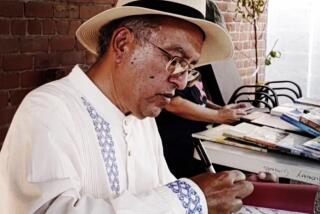MUSIC REVIEW : Ricci/Rosen/Rodriguez Trio in Pasadena
- Share via
Ricci, Rosen and Rodriguez sounds like a hip, multiethnic law firm. The trio, however, is a musical one, of contradictory, ultimately potent, qualities.
The virtues of the ensemble--Ruggiero Ricci, violin; Nathaniel Rosen, cello; Santiago Rodriguez, piano--were made very clear in a canny program at Ambassador Auditorium Tuesday evening. The trio surrounded familiar Shostakovich and Dvorak with not-so-familiar Beethoven.
It was in the opening Beethoven--the Trio in E-flat, Opus 1, No.1--that the group’s liabilities were most apparent. It took much of the work to establish smooth balances and teamwork in what is, after all, largely a piano piece with accompanying strings.
Rodriguez turned it out neatly enough, in a light, clean style, with all the interpretive weight placed on the Andante cantabile. Rosen supported him gracefully, within the confines of his modest part.
Ricci, who will be 70 next summer, is not quite the master of the flying bow that he once was. He showed a tendency to begin phrases with a heavy crunch--roughing up the Scherzo particularly crudely--and his spiccato now has more bounce than bite.
Matters improved considerably, partly through warming-up and mainly through more favorable repertory. By encore time, ensemble values were well settled, and the threesome produced a sunny, lyrical account of a seldom heard Trio movement in B-flat, without opus number but apparently from Beethoven’s middle period.
A change was immediately evident in Shostakovich’s Opus 67 Trio, in E minor. Rosen opened with a technically secure, emotionally drained playing of the plaintive, notoriously treacherous theme in harmonics. Ricci’s muted entrance merged beautifully, and the performance grew from there in weight and nuance.
Shostakovich put plenty of energetic fury into the Trio, but chilly despair is its dominant characteristic. Ricci, Rosen and Rodriguez delivered both the passion and the pain, with remorseless emotional control and musical logic.
Dvorak’s “Dumky” Trio, Opus 90, is also in E minor and also a generally mournful work. But Dvorak’s sorrows are expressed in more fire than ice, and the players responded with a warmly melancholic performance, one that was also alert to the brightening moments of peace and the leaping dance qualities of many passages.
Ricci, Rosen and Rodriguez seemed to enjoy their work, at least after it was done. Strong, steady applause from a gratifying full audience finally brought them back for the Beethoven encore.
More to Read
The biggest entertainment stories
Get our big stories about Hollywood, film, television, music, arts, culture and more right in your inbox as soon as they publish.
You may occasionally receive promotional content from the Los Angeles Times.









